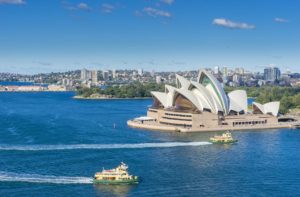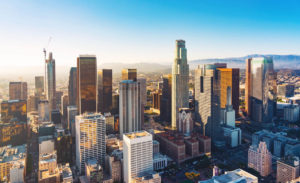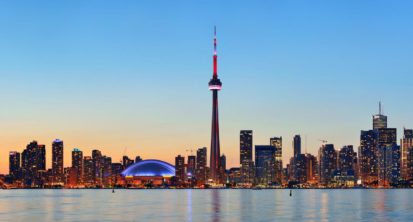Australia: Fair work high-income threshold 2020
The Fair Work Commission has released its annual increase to the high-income threshold. This threshold affects the salary benchmark that applicants aged over 45 years must now meet. 
As at July 1, 2020, the high-income threshold is 153,600 AUD – a 4,900 AUD increase on the 2019/20 threshold.
The threshold is indexed every year (effective July 1), with the period representing the tax (or fiscal) year.
This summary was prepared using information obtained from the Fair Work Commission.
Disclaimer: The above information is provided for general information purposes only and should not be construed as legal advice. If you have any further inquiries regarding the applicability of this information, please contact Debra Jane Beynon, Regional Immigration Manager (APAC).
United States: Possible visa restrictions for employees of Chinese tech firms
The U.S. plans to impose visa restrictions on certain employees of Chinese technology companies, such as Huawei that (according to the United States views) provide material support to regimes engaging in human rights violations and abuses globally. It’s still not clear how employees would be categorized and affected.
This was announced when President Trump signed the Hong Kong Autonomy Act and Executive Order removing the city’s preferential trade status.
The U.S. has already revoked Hong Kong’s preferential access to export license exemptions, cutting the city off from sensitive technology shipments from the U.S. in response to China’s controversial national security law.
This summary was prepared using information obtained from CNN.
Disclaimer: The above information is provided for general information purposes only and should not be construed as legal advice. If you have any further inquiries regarding the applicability of this information, please contact Roberta Carnaccini, Global Operations Director, Immigration.
Latest coronavirus news:
APAC
China:
The China Civil Aviation Bureau will only accept inbound passengers presenting a negative nucleic acid test issued within five days prior to boarding. More info at: CAAC News (in Chinese)
Hong Kong:
Inbound travelers from specified countries must follow additional processes before arriving in Hong Kong.
- The following nationals must provide test results and hotel bookings:
- Bangladesh
- India
- Indonesia
- Nepal
- Pakistan
- The Philippines
- South Africa
Travelers are encouraged to submit this information via the online form: www.chp.gov.hk/hdf. After submission, the system will generate a QR code that can be saved and presented to border control upon arrival in Hong Kong. The QR code is valid for 24 hours and paper forms are still available for submission at clearance ports.
- New applications for employment and training visas will not be accepted.
- Applications submitted before July 20 will continue to be processed, but delays are expected due to special work arrangements for civil servants.
- Visa extensions will be accepted for visas expiring from July 20 and will require processing. Applications may not be processed the same day but visa extensions, already submitted and ready to collect, can still be collected. Hong Kong ID card applications are being accepted for replacement cards only.
More info at: Gov.hk
Philippines:
- The General Community Quarantine enforced in the National Capital Region has been extended until July 31, 2020, with the below updates on inbound and outbound travels:
- Outbound travel for Filipinos (from July 22, 2020): Unless a permanent resident, Overseas Filipino Worker (OFW) or holder of a study visa in the destination country, Filipinos must comply with the following requirements:
- Submission of a confirmed return ticket for those traveling on tourist visas.
- Adequate travel and health insurance to cover rebooking and accommodation expenses, if stranded, and hospitalization, if infected, of such amount to be determined by the Department of Tourism.
- Allowed entry by the destination country in accordance with their travel, health and quarantine restrictions.
- Execution of a Declaration acknowledging the risks involved in traveling, including risk of delay in their return trip, to be provided at airline check-in counters; and
- Upon return, compliance with the Guidelines for Returning Overseas Filipinos issued by the National Task Force (NTF).
- Inbound travel for foreign nationals (effective August 1, 2020):
- The following visas will be allowed to enter the Philippines:
- Section 13 series visas
- Republic Act No. 7919 visa (granting permanent resident status to qualified illegal alien)
- Executive Order No. 324 visa (waived passport requirements for immigrants under certain conditions)
- Native-born visa
- The following visas will be allowed to enter the Philippines:
- Outbound travel for Filipinos (from July 22, 2020): Unless a permanent resident, Overseas Filipino Worker (OFW) or holder of a study visa in the destination country, Filipinos must comply with the following requirements:
Provided, that they:
-
-
-
- Have a valid and existing visa at the time of entry.
- Have an accredited quarantine facility pre-booked.
- Have a Covid-19 testing provider pre-booked.
- Are subject to the maximum capacity of inbound passengers as set by the NTF.
-
-
Those with a 9g (work) visa, 9d (treaty trader) visa, 47a2 visa, EO226 visa, 9a (tourist) visa and similar are still not allowed to enter. For essential and emergency reasons, a request for endorsement to secure travel ban exemption may be filed with the Philippine Economic Zone Authority (PEZA), for PEZA-registered entities, or with the Department of Foreign Affairs (DFA) for non PEZA-registered entities. Processing at the DFA will take approximately one week, providing that the reason for the travel ban exemption is justifiable and the documents are complete.
- General guidelines upon arrival/return to Philippines via airport (as at May 1, 2020):
- All overseas Filipinos and foreign nationals arriving at an airport shall be subject to:
- Evaluation upon arrival for cohort risk-assessment based on the latest issuance of the WHO Covid-19 Situation Report.
- Individual thermal scanning.
- Medical assessment by a Quarantine Medical Officer (QMO) that shall be the bases for classifying them as either for Stringent Quarantine or for Mandatory Quarantine.
- Stringent Quarantine:
- Those under Stringent Quarantine shall undergo Reverse Transcription Polymerase Chain Reaction (RT-PCR) conducted by a Department of Health (DOH)-Licensed Covid-19 Testing Laboratory at the port of entry or designated quarantine facility. And shall stay in a Bureau of Quarantine (BOQ)-approved Stringent Quarantine Facility until the test results are released.
- If negative, the individual will be allowed to discontinue facility-based Stringent Quarantine, but must undergo a 14-day home quarantine at their respective domicile, residence or appropriate local monitoring facility.
- If positive, the individual will be transferred to a referral hospital or Temporary Treatment and Monitoring Facility for further medical management.
- Mandatory Quarantine:
- Those under Mandatory Quarantine will undergo Rapid Antibody Covid-19 testing upon arrival and a 14-day Mandatory Quarantine at an Overseas Workers Welfare Administration (OWWA)-designated Mandatory Quarantine Facility.
- If individuals are financially capable, they may be allowed to stay in BOQ-approved or OWWA-designated hotel quarantine facilities of their choice upon proper endorsement of the BOQ or OWWA.
- All overseas Filipinos and foreign nationals arriving at an airport shall be subject to:
No source available at the time of writing, please contact Debra Jane Beynon, Global Operations Director, Immigration, for more info.
Singapore:
- All travelers entering or transiting Singapore from the Australian state of Victoria, Japan and Hong Kong within the last 14 days will be required to serve their Stay Home Notice (SHN) at government facilities.
- All incoming travelers (regardless of citizenship) will be tested for Covid-19. The test will be scheduled a few days before the end of the SHN period at a designated testing facility. The cost of Covid-19 tests will be borne by the travelers.
- Employers will be required to purchase a local SIM card on behalf of the foreign national, accompanying spouse and children above the age of 12. Spouse and children will be required to have their own local mobile no. (no longer tagged to the Employment Pass holder’s local mobile).
- SIM cards can be delivered to hotel lobbies once the employee checks in. Employees and dependents will need to immediately activate the SIM card and download the Homer and WhatsApp application. MOM officers will connect with the pass holders via these apps.
No source available at the time of writing.
Disclaimer: The above information is provided for general information purposes only and should not be construed as legal advice. If you have any further inquiries regarding the applicability of this information, please contact Debra Jane Beynon, Regional Immigration Manager (APAC).
EMEA
Switzerland:
Arrivals from certain countries and areas are required to go into quarantine. More info at: The Federal Council
Disclaimer: The above information is provided for general information purposes only and should not be construed as legal advice. If you have any further inquiries regarding the applicability of this information, please contact Laxmi Vikraman, Regional Immigration Manager (EMEA).
We track policy changes in over 120 countries. Find out how we can help you in this short video.




